Solar Panel Maintenance Tips
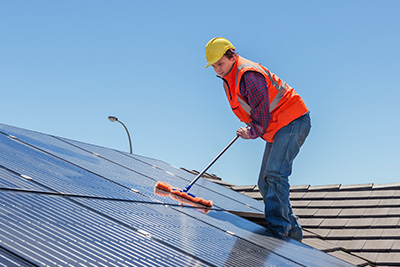
If you’re thinking about adding solar panels to your home, there’s no need to worry about routine maintenance. Solar panels are extremely durable, and most homeowners can keep them in good working condition with just a few minutes of maintenance per year.
Check out our best solar panel maintenance tips to ensure your panels continue to operate at peak efficiency, bringing you clean, renewable solar power for years to come.
Why Perform Solar Panel Maintenance?
Most of the time, your solar panels can take care of themselves – they’re built to be outdoors, after all. But if solar panels become dirty or obstructed, they won’t produce as much electricity as they would otherwise.
It’s a good idea to clean your solar panels every three to six months, or if your area has recently experienced a high concentration of airborne particulates like dust, smoke or pollen. If your solar panels are installed at an angle, rainfall may do some or all of this cleaning for you. But during prolonged periods of dry weather, manual cleaning may be required.
Leaves, tree limbs and other airborne debris can also land on your solar panels, blocking the sunlight. In the winter, snow and ice can leave your solar panels buried. These obstructions will all need to be cleared manually to restore your solar panels to their full potential.
How to Clean Solar Panels
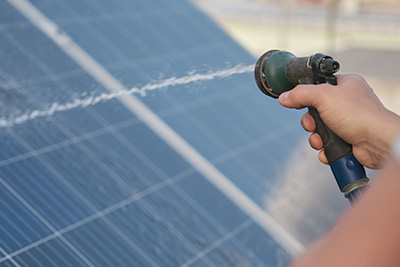
The easiest way to clean dirt, dust and other particulates from solar panels is to spray them with a garden hose. If that doesn’t get the job done, you can use a long-handled window cleaning tool with sponge and squeegee attachments to clean them more thoroughly. This may involve standing on a ladder, so be sure to use a spotter and take all proper safety precautions when doing so. If your solar panels are installed in a high or precarious position, you should hire a professional to perform this maintenance for you.
When cleaning your solar panels, it is important to avoid using any chemical cleaners or other products. You should only use ordinary tap water.
To clear leaves, tree limbs and other debris, use a soft-bristled broom, leaf blower or long-handled grabbing tool. Again, if this requires use of a ladder, work with a partner and put safety first.
To clear snow and ice, it’s best to use a soft-bristled broom or long-handled squeegee. If you can remove a layer of snow, sunlight may be able to melt away what remains in a few hours. If you’re able to do so safely, you can pour or spray lukewarm water over your solar panels to melt snow and ice more quickly. But it’s important not to use hot water, as this could crack the tempered glass during cold weather conditions.
Monitoring Your Solar Panel Output
While you can see some obstructions with the naked eye, you might not notice a buildup of dust or pollen on your solar panels. But even a thin layer of particles can take a bite out of your solar energy output, so it’s a good idea to monitor this output over time. Many solar energy systems are compatible with smartphone apps that make it easy to track this information. If you’re not sure how to track yours, ask your solar installer for help.
Once you know how much electricity your solar panels produce under optimal conditions, you can take action if you notice a sudden decrease in energy output. You can also monitor any gradual decline in output to help you decide if and when to replace your solar panels, though most are designed to last 25 years or longer.
Looking for Something Specific?
Select a category to find resources for topics that interest you.
Select Category

Related Articles:
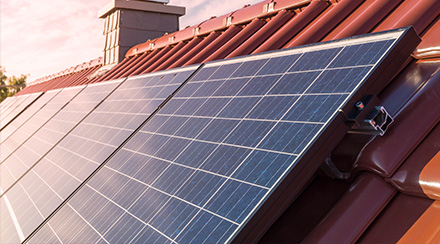
What Is Solar Energy and How Does it Work?
Thanks to rapidly advancing technology, a growing share of our energy comes from renewable sources like wind, hydropower and solar. Learn about solar energy and how it provides for homes and communities.
Read Article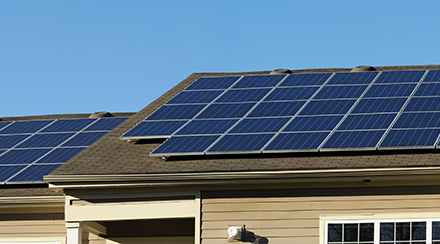
How Do Solar Panels Work?
Rooftop solar panels are among the most visible symbols of a new energy future that is cleaner, healthier and more renewable. But do you know how solar panels work?
Read Article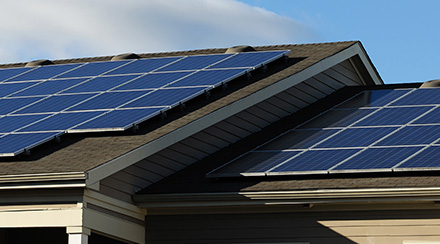
The Different Types of Solar Panels
When deciding what type of solar panel is best for your home, it’s worth taking the time to weigh the pros and cons of each panel type against your budget, climate and energy needs.
Read ArticleMost Popular Articles

Residential Solar Panels
Want to produce your own solar energy? NRG Solar+ guides you through how rooftop solar works and what it could look like for your home. Learn More.
Solar Panel Maintenance Tips
If you’re thinking about adding solar panels to your home, there’s no need to worry about routine maintenance. Solar panels are extremely durable, and most homeowners can keep them in good working condition with just a few minutes of maintenance per year.
Check out our best solar panel maintenance tips to ensure your panels continue to operate at peak efficiency, bringing you clean, renewable solar power for years to come.
Why Perform Solar Panel Maintenance?
Most of the time, your solar panels can take care of themselves – they’re built to be outdoors, after all. But if solar panels become dirty or obstructed, they won’t produce as much electricity as they would otherwise.
It’s a good idea to clean your solar panels every three to six months, or if your area has recently experienced a high concentration of airborne particulates like dust, smoke or pollen. If your solar panels are installed at an angle, rainfall may do some or all of this cleaning for you. But during prolonged periods of dry weather, manual cleaning may be required.
Leaves, tree limbs and other airborne debris can also land on your solar panels, blocking the sunlight. In the winter, snow and ice can leave your solar panels buried. These obstructions will all need to be cleared manually to restore your solar panels to their full potential.
How to Clean Solar Panels
The easiest way to clean dirt, dust and other particulates from solar panels is to spray them with a garden hose. If that doesn’t get the job done, you can use a long-handled window cleaning tool with sponge and squeegee attachments to clean them more thoroughly. This may involve standing on a ladder, so be sure to use a spotter and take all proper safety precautions when doing so. If your solar panels are installed in a high or precarious position, you should hire a professional to perform this maintenance for you.
When cleaning your solar panels, it is important to avoid using any chemical cleaners or other products. You should only use ordinary tap water.
To clear leaves, tree limbs and other debris, use a soft-bristled broom, leaf blower or long-handled grabbing tool. Again, if this requires use of a ladder, work with a partner and put safety first.
To clear snow and ice, it’s best to use a soft-bristled broom or long-handled squeegee. If you can remove a layer of snow, sunlight may be able to melt away what remains in a few hours. If you’re able to do so safely, you can pour or spray lukewarm water over your solar panels to melt snow and ice more quickly. But it’s important not to use hot water, as this could crack the tempered glass during cold weather conditions.
Monitoring Your Solar Panel Output
While you can see some obstructions with the naked eye, you might not notice a buildup of dust or pollen on your solar panels. But even a thin layer of particles can take a bite out of your solar energy output, so it’s a good idea to monitor this output over time. Many solar energy systems are compatible with smartphone apps that make it easy to track this information. If you’re not sure how to track yours, ask your solar installer for help.
Once you know how much electricity your solar panels produce under optimal conditions, you can take action if you notice a sudden decrease in energy output. You can also monitor any gradual decline in output to help you decide if and when to replace your solar panels, though most are designed to last 25 years or longer.
Looking for Something Specific?
Select a category to find resources for topics that interest you.
Select Category

Related Articles:

What Is Solar Energy and How Does it Work?
Thanks to rapidly advancing technology, a growing share of our energy comes from renewable sources like wind, hydropower and solar. Learn about solar energy and how it provides for homes and communities.
Read Article
How Do Solar Panels Work?
Rooftop solar panels are among the most visible symbols of a new energy future that is cleaner, healthier and more renewable. But do you know how solar panels work?
Read Article
The Different Types of Solar Panels
When deciding what type of solar panel is best for your home, it’s worth taking the time to weigh the pros and cons of each panel type against your budget, climate and energy needs.
Read ArticleMost Popular Articles

Residential Solar Panels
Want to produce your own solar energy? NRG Solar+ guides you through how rooftop solar works and what it could look like for your home. Learn More.







